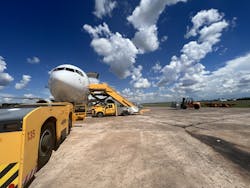Following the COVID-19 pandemic, the business aviation industry has been resilient. This is also true for the vibrant business aviation industry in many areas Central and South America.
Business aircraft handling across Central and South America requires attention to specific details but offers numerous benefits, including options to foreign aircraft operators.
A Dynamic Industry
Certain parts of Central and South America are very dynamic for business aviation. To ensure a smooth experience, it is essential to plan ahead of time, according to the schedule and carefully select a trustworthy partner, affirms Gabriel Díaz de Bedoya chief executive officer (CEO) of Consorcio Aviation.
“Also, it is important to note that each country has its distinct set of requirements, varying lead times, and unique bureaucratic systems. It becomes crucial to thoroughly research and understand the specific regulations and protocols of the country in question, as well as payment options since these can also delay any program,” he says. “This is where a reliable partner that has years of relationship building and due diligence for good in-to-plane agents comes in.”
Indeed, since the pandemic, business aviation has been growing very fast, and the success of the last edition of the largest business aviation event in Latin America, LABACE, last August, is evidence of that, declares Ricardo Miguel, director of ABESATA.
“We recommend that aircraft operators be very careful when hiring a ground handling company to support their aircraft. Based on this, and in order to help the aircraft operators choose a reliable ground service provider (GSP) in Brazil, we created the Ground Services Providers Regulatory Certification (CRES),” he explains. “The ground handling companies which achieved this certification have proven that their operations are in a regular condition and in a healthy structure, bringing more confidence to their customers.”
Kevin Bourne, security services manager at Caribbean Aircraft Handling also believes that Central and South America has a very dynamic business aviation industry.
“Our rule is to ensure that those who operate here can be confident that their product shines, to bridge any language barrier, and that they have the best service possible,” he says.
Benefits and Challenges
Each country in the region is very different in how the operations are managed, affirms Díaz de Bedoya.
“Ground handlers can be private companies, multinationals, or even the actual government body that runs the airport,” he says.
According to the Agência Nacional de Aviação Civil (ANAC) – Brazil’s civil aviation authority, Resolution 116 of October 2009, ground handling services in Brazil can be provided by the airport operator, by the aircraft operator itself or by a contracted business company, such as a ground service provider, explains Miguel.
“Only a few particularities differ Brazil from other markets in the world when it comes to ground assistance, for example when a jet oil company needs to comply with the legislation of the National Petroleum Agency,” he explains. “Among the sector’s peculiarities there is the need of GSP customers to take care when hiring ground support. It is not and has never been just a matter of cost, but also a crucial decision related to operational safety which is everyone’s responsibility in the aeronautical chain.”
A noteworthy challenge in the region is the language barrier, according to Díaz de Bedoya.
“Although most agents speak English, many times comprehension levels are distinct and this can create unnecessary challenges and delays,” he points out.
When it comes to selecting a flight support agent, ground handler and other providers, one must be aware of companies that may create marketing material to attract any business but may not handle the deals directly, or are very far removed from the actual service, highlights Díaz de Bedoya.
“This is where a company should look at accreditations, certifications or inquire on client references to insure they are dealing with a professional and experienced company,” he says. “It is also noteworthy that everybody in every country we have worked in has a strong commitment to ensure safety and provide the best service possible to enable passengers and crew to have a smooth experience.”
According to Bourne, GSPs have to be very responsive to the needs of customers and make sure that that they are delivering on what the customers want.
“In the Caribbean, it becomes critical how fast we can respond and determine what we can generate for them, as there is limited connectivity between the Caribbean and other parts of the world, so there is the risk of being cut off in terms of support,” he says.
Options for Foreign Operators
Foreign aircraft operators have plenty of options with brokers, flight support and local handlers, according to Díaz de Bedoya.
“Self-handling is not recommended, especially for first time operations because at most airports it is not viable, and, if one attempts it, it can generate problems, penalties, being overcharged and other issues,” he says. “Also, in case of a multiple-stop operation, it is better to choose a flight support company that has enough experience in several countries as they will have the know-how and vetting process of suppliers and crucially, avoid missing scheduled times, slots, etc.”
In Brazil an aircraft operator can perform auxiliary services for its own aircraft or for another aircraft when there is a code share in place, explains Miguel.
“Not different from what happens worldwide, here in Brazil, hiring specialized companies allows aircraft operators and airports to focus on their core activity and bring a significant cost reduction for the foreign operator,” he says. “However, the aircraft operator’s main concern is to know about the quality of services provided by the GSP. CRES, through self-regulation, is a valuable tool that can help an operator when hiring ground handling services.”


